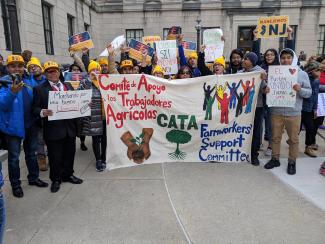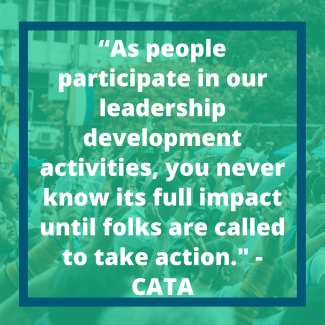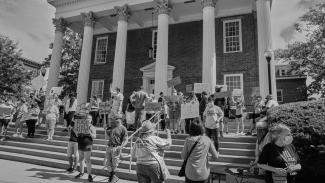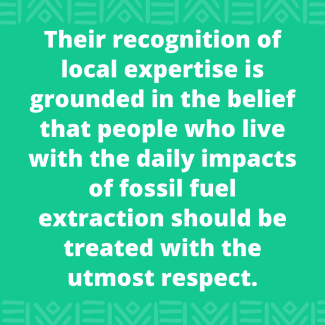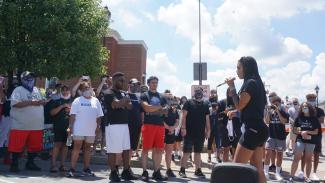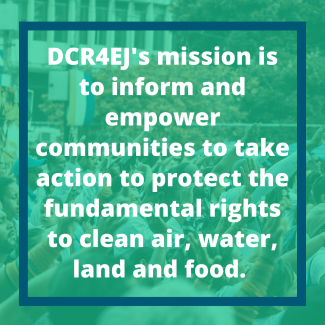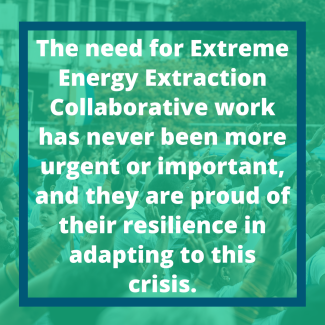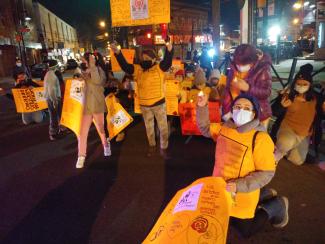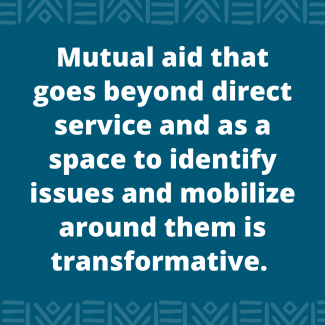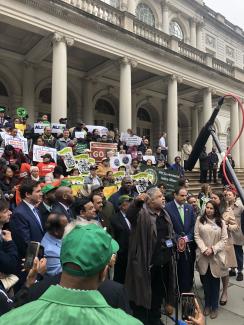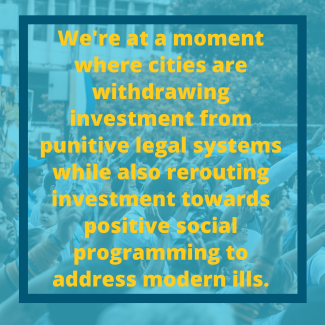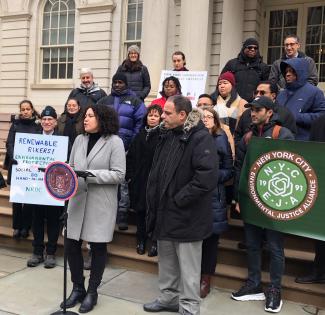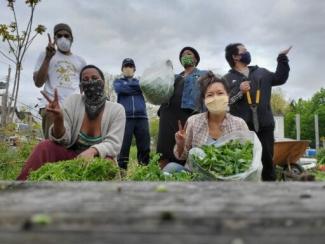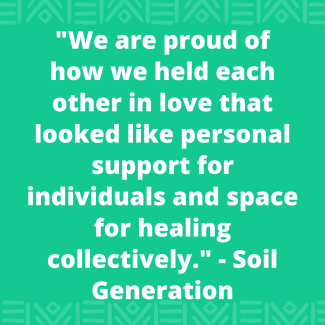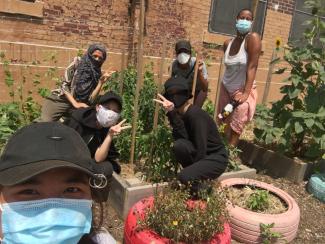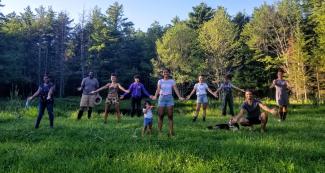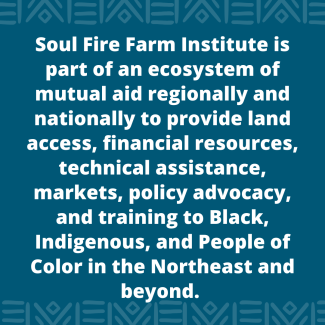2020 Atlantic Spotlight Series
We are highlighting the dynamic work of 2020 BEA Fund grantees as part of a multimedia series that will include written features sent to our listserv, social media and here on the website.
Read about our BEA Fund Grantee Spotlight organizations below.
- CATA - Comite de Apoya a los Trabajadores Agricolas
-
CATA’s overall strategy is to organize and develop leadership capacity among the Latino immigrant community, build a wide range of support for farmworker and low-wage worker justice by working in coalition with others on common issues, and ultimately impact public policies that directly affect the Latino community. Within this strategy they see the interconnectedness of issues facing the community including labor, sustainable agriculture, health, environment, and trade/food issue and attempt to address them in a holistic manner.
According to CATA “Community members advocating for themselves is very powerful and builds their confidence to take on future challenges. This occurred a few times this year with members providing testimony and meeting with legislators to tell their story during the Driving PA Forward Campaign. In New Jersey, folks from the Social Activism Committee were also engaged in meetings with legislators and community education activities.”
Despite the COVID-19 pandemic, CATA and its members have remained engaged and focused on justice issues related to workers’ rights, immigrant rights, and food justice. During this crisis, they have adapted organizationally in order to continue building community capacity and to effectively meet current challenges. Coalition work has been instrumental in continuing to have influence on such things as drivers’ license policies, paid sick and family leave, and DACA regulations.
Check out their advocacy webpage and the work they've done in the past year.
- Center for Coalfield Justice
-
Center for Coalfield Justice’s approach for working with area residents values their knowledge about the land, waterways, and communities. They provide community members with detailed information about proposed projects and potential impacts so they can make informed decisions on individual or collective actions. Their recognition of local expertise is grounded in the belief that people who live with the daily impacts of fossil fuel extraction should be treated with the utmost respect. By blending organizing and legal work, they seek to create an expanded set of options for achieving justice than might be produced by following solely a legal or organizing approach.
When organizing and shifting the culture, it can be challenging to see moments that show progress. Center for Coalfield Justice saw and felt the result of this power building on November 7th when they held a car rally to protect the vote. At the rally, they had over 30 people with participants varying in race, gender, age, and ability. Their speakers were from our communities and covered the importance of voting across the issue sector.
Over the past year, the Center for Coalfield Justice has been engaging with residents through digital and social distanced events to build relationships across race and class, resulting in two demonstrations for Black Lives and a powerful rally on November 7th, Protect the Vote. Their members are increasing their skills and understanding of how to shift power in their small towns and rural communities. They look forward to working with our neighbors over the coming year in the fight for economic, environmental, and racial justice.
- Delaware Concerned Residents for Environmental Justice (DCR4EJ)
-
Delaware Concerned Residents for Environmental Justice (DCR4EJ) is a group of community residents who are disproportionately impacted by environmental hazards in their neighborhood. DCR4EJ's mission is to inform and empower communities to take action to protect the fundamental rights to clean air, water, land and food. Realizing that DCR4EJ alone could not address the enormous environmental injustices that were faced on a daily basis made the critical decision to restructure. In 2018, under the leadership of Community Housing & Empowerment Connections Inc. (CHEC), they sought to strengthen the capacity of our environmental justice efforts and formed the Delaware EJ Community Partnership. The Partnership brought CHEC, DCR4EJ, NAACP Health committee, Minority Workforce Development Coalition, Southern Delaware Alliance for Racial Justice, Socially Responsible Agriculture Program, Sierra Club DE and other stakeholders together to support each other. The primary role of DCR4EJ is decision-making, advocacy and information dissemination. "We are the constituency that we serve." They welcome and invite others that share their vision on addressing EJ and building community power on the frontlines.
- Extreme Energy Extraction Conference @ Catskill Mountain Keeper Inc.
-
Through Catskill Mountainkeeper's work to ban fracking in New York, they became aware not only of how much their fight parallels other fracking fights in the country, but also how similar it is to fights against all extreme methods of extracting, mining and processing fossil fuels. This awareness led them to co-found the Extreme Energy Extraction Collaborative (E3C), an alliance of over 80 grassroots organizations that are each fighting the extreme energy methods that are specifically affecting their communities.
One important concrete result this year was an upcoming national letter opposing LNG exports, which was signed onto by 150 different organizations within the movement and will be sent to President Biden. Again, E3C’s deep relationships and strong history of collaboration were key factors in bringing this cooperative effort to fruition.
As it has changed so many things about our world, the Covid-19 crisis has carved out a completely new landscape for E3C’s work, and they’ve had to shift gears, recalibrate their plans and priorities, and change the format of much of their work. That said, the need for E3C’s work has never been more urgent or important, and they are proud of their resilience in adapting to this crisis. E3C has been called on to play a role that wasn’t anticipated, but have stepped up to the plate to move on in new ways that will empower and drive our movement forward.
- New Labor & Education Training Institute, Inc.
-
New Labor is an organization based in New Jersey that educates, organizes, and fights for better work conditions and social justice in the workplace. With a base of around 4,000 members, New Labor organizes to empower their members and amplify their voices in the community, workplace, and political realm. They are guided by five fundamental principles: (1) Working Together (2) Creating Opportunities (3) Respect (4) Empowerment (5) Equality.
New Labor spearheaded a multi-organization coalition that is in NJ based on health and safety; as an organizing tool that is building leaders to do training and enforcement, they have done incredible work. The same can be said for the NJ Survivor's coalition that is multi-racial and covers a spectrum of expressions of gender identity. New Labor writes: “The pandemic helped solidify this as their "necessity", but it is also years of building working relationships of trust.”
Their work to silo bust, with groups like Newark Water Coalition and Ironbound Community Corporation have expanded a network that collectively fights for change on a variety of issues, from workplace health and safety and wage theft, to clean water and clean air.
- New York City Environmental Justice Alliance
-
NYC-EJA works closely with our eleven member organizations on environmental justice issues in local communities, citywide, and statewide. They continually share community priorities and projects, learn from each other’s work, and collaborate to build greater power. NYC-EJA hosts monthly member calls to help facilitate these conversations and shared learnings, in addition to ongoing meetings and coordination on specific campaign areas.
NYC-EJA is working at the intersection of these forces. In February 2020, the NYC Council passed the Renewable Rikers Act, which will transfer jurisdiction of Rikers Island from the Department of Correction (DOC) to the Department of Citywide Administrative Services (DCAS) and mandates a feasibility study on the island’s potential to generate and store renewable energy. As NYC-EJA collectively works toward achieving the goal of the NY Climate Leadership and Community Protection Act (CLCPA), they are eager to take this opportunity to build a Renewable Rikers that will be a hub for large-scale renewable energy and battery storage technology that can move us toward shutting down fossil fuel peaker power plants that pollute environmental justice communities.
In February 2021 NYC-EJA released its Community Air Mapping Project for Environmental Justice (CAMP-EJ) report. Working hand-in-hand with their member organizations, they recruited and organized dozens of community members and empowered them to be active participants and leaders in collecting and interpreting hyperlocal PM2.5 data. By prioritizing community participation, youth education, and leadership development NYC-EJA member organizations successfully collected thousands of hours of air quality measurements over the course of more than two years.
- Soil Generation
-
Soil Generation is a Black and Brown led coalition of growers in Philadelphia, building a grassroots movement through relationship building, honoring culture, community education, organizing, activism and advocacy: A people’s agroecology.
This year the key issues they were dealing with was supporting the mental and spiritual health of the folks currently doing this work to be able to grow the base in the next few years. Soil Generation writes: “Although there was much more interest in growing on the community level, our folks felt the need to respond to their families and their own personal healing and we at Soil Generation support that. Growing our base was not a priority during the pandemic. Our collective healing was. We are proud of how we held each other in love that looked like personal support for individuals and space for healing collectively.”
Soil Generation will be showing their video about Agroecology on the CJA Story snapshot soon. This will serve as a companion for our "Agroecology From the People" manual that will be released in a community event on Sept 19th.
- Soul Fire Farm Institute
-
Soul Fire Farm Institute is part of an ecosystem of mutual aid regionally and nationally to provide land access, financial resources, technical assistance, markets, policy advocacy, and training to Black, Indigenous, and People of Color in the Northeast and beyond.
The Stockbridge-Munsee Band of the Mohican Nation accepted a cultural respect easement from Soul Fire Farm, which grants Mohican citizens the legal right to use the Commons area of Soul Fire Farm for ceremonies and wildcrafting in perpetuity. They also collaborated with the Mohican nation to defeat the E37 natural gas pipeline that would cut through Papscanee Island on the Mahicannituck (Hudson) River, one of the sacred sites of the Stockbridge Munsee-Mohican people. Soul Fire Farm Institute was part of the resistance, and are excited that the project has now been suspended indefinitely.
They’re also hosting a 3D series: a multilingual and multidimensional workshop series designed for B.I.P.O.C. (Black, Indigenous, &/or People or Color) to deepen skills in specific farming and homesteading practices in a culturally relevant, supportive, and joyful environment. They invite expert facilitators to offer workshops throughout the season, paying homage to legacies of African Diasporic and Indigenous wisdom and innovation carried through generations. https://www.soulfirefarm.org/food-sovereignty-education/3d/
Soul Fire Farm also hosts community work days and tours
